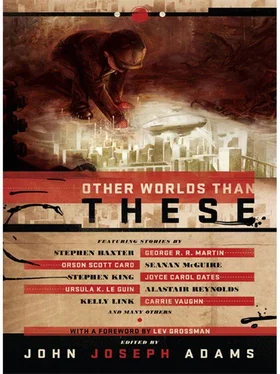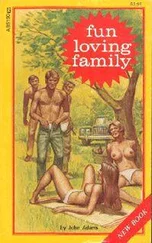“It was weird,” he said, “but weird shit happens through the mirror. We just have to deal with it.”
“Glad to hear it.”
And after that, Ernie Wright did seem to be dealing with it. I overheard him having an earnest conversation with Leroy Moss, who carried a copy of the Bible in the breast pocket of his flak jacket, about the nature of souls and their indivisibility. He shrugged off Tommy McAfee’s jibes. And then, two weeks later, the platoon was given a day of R&R, and he disappeared.
I didn’t find out what had happened until the next day, when the military police took charge of Ernest Wright, the man Tommy McAfee had claimed to be Ernie Wright’s doppelgänger.
It seemed that Ernie had changed into civilian clothes, hitched a ride out of Emerald City in a contractor’s truck, and turned up at Ernest’s apartment later that evening. Drunk but lucid, saying he wanted a quiet word, offering cigarettes and a bottle of Four Roses. A gift, he said, for the trouble a couple of weeks back. Ernest had deep misgivings, but he also felt sorry for Ernie, who seemed sad and bewildered and lost. And he was curious, too. So he invited Ernie in and made coffee, and they got to talking. They shared the same parents, but Ernie’s had met several years before Ernest’s had, Ernie’s mother had died giving birth to a still-born baby when he was two, his father had become a serious drunk, and Ernie had joined the Army to get away from the son of a bitch, who had died three years ago, when his liver had finally given out on him.
“I don’t miss him,” Ernie said. “Not one bit.”
Ernest’s father—the American Bund’s version of Ernie’s father—had died in a traffic accident when Ernest was less than a year old. A couple of years later, his mother had remarried, to another teacher in the high school where she worked.
“That’s how you got to be a college professor, uh?”
“There were always books in the house.”
They talked about the town where they had been born, the little house where Ernie had lived with his father until he joined the Army. Ernest and his mother had moved out when he was three, he didn’t remember much about it.
“I think there was a cherry tree in the front yard,” he said.
Ernie smiled. “It was still there, last time I looked. Same tree, different lives.”
“Two different trees, really,” Ernest said. He told Ernie how he’d won a scholarship and come to New York to teach and study literature; Ernie told him a little bit about his so-called career in the army, fighting in a sheaf wrecked by nuclear war, and now policing the streets of New York.
“I never really knew my mom,” he said. “And my dad was a mean drunk who beat me ’til I got big enough to beat him. But you had a real family. You have a college degree, all those books…”
“If you knew what it was like, growing up here, under the thumb of the Dear Leader and his psychopathic sons and his secret police, you might not think it was so great,” Ernest said. He’d been tense and nervous all through their conversation, growing more and more resentful about the intrusion. “Look, it was nice to talk to you. Strange, but nice. But I have to go to work tomorrow.”
“Me too. Out on the streets. Hey, I was just wondering,” Ernie said with ponderous casualness, “about your mother. Is she still alive?”
That was why he’d come there, of course. It wasn’t anything to do with Ernest, who was at best a brother he’d never known. No, Ernie Wright was chasing the ghost of his long-dead mother.
He looked for a long time at a snapshot Ernest reluctantly gave him, asked if she was still living in their home town. Maybe he could look her up some time, he said, and grew agitated after Ernest said that he didn’t think that this was a good idea. Ernie blustered, said that he barely remembered his mother, all he wanted was to see how she had turned out, what was the harm? Sharp words were exchanged. Ernie started to paw through papers on the table Ernest used as a desk, drew his pistol when Ernest asked him to stop. Ernest panicked, threw coffee in Ernie’s face, and the pistol went off. The shot barely missed Ernest. There was a struggle, another shot. That one hit Ernie in the thigh, nicking his femoral artery. There was a lot of blood. Ernest went to the apartment next door, which had a phone, and called an ambulance, but it took two hours to arrive because there were road blocks everywhere. Despite the best efforts of Ernest and his neighbours Ernie Wright bled to death on Ernest Wright’s old Persian carpet.
Ernest Wright told me all this in a bleak interrogation room in Camp X-Ray, the holding facility for suspects in bombings or shootings, people caught trafficking weapons and explosives, curfew violators, and anyone else who had gotten into some kind of trouble with the occupying army. He’d been arrested on suspicion of murder by the local police, but they’d handed him over to us after they had discovered that the dead man in his apartment was a soldier. My commanding officer had advised me not to visit him, but it had happened on my watch and I felt responsible. I wanted to know what had happened so that I could figure out what I had done wrong. Also, I had read the transcript of Ernest Wright’s interrogations, I had talked to the local police who had handled the case, and I was convinced that he was innocent.
When I told him this, he thanked me for my concern, and for my offer to give supporting testimony should his case come to trial. He told me the story while smoking several of the cigarettes I had brought, and at the end lit a fresh one and said, “There’s a writer who described time as a garden of forking paths. Whenever someone makes a decision, it doesn’t matter how small, it splits time into two. So there’s this time, here and now, and another time where you decided not to help me.”
I told him that I was familiar with the concept. By this time, I had read A Brief Guide to Other Histories several times from cover to cover, trying to find something that would help me understand what had happened.
“An infinite series of paths, some divergent, some convergent, some running in parallel,” Ernest Wright said. “Until a year ago, I thought it was just a story. A philosophical conceit. But then your people made themselves known when the revolution started. You sent troops through their Turing gates and helped defeat the Dear Leader. You told us that their agents had been visiting our history secretly before that, helping set up the revolution. You told us that you wanted to help us build a better America. But what you’re really doing is shaping us in your image.”
“We really do want to help you.”
“Your path is only one of an infinite number of paths. And no one path can claim to be better or more privileged than any other. All are equal.”
“Except we have the Turing gates,” I said.
“Which gives your history the ability to interfere with other histories, other Americas. But it doesn’t give your history moral superiority. You brought us freedom. Democracy. Fine. We’re grateful for it, but we’re not beholden. We have the right to make from that freedom what we will, whether you approve of it or not. If we’re forced to become nothing more than a pale imitation of your version of America, what kind of freedom is that?”
I told him that he sounded a little like the deadenders, and he shook his head. He was thinner than I remembered, but because his head had been shaved and he had lost his mustache it seemed to me that he looked a lot more like Ernie Wright now. Or my memory of Ernie.
“The deadenders believe that they can restore the Bund if they can push you back through the mirror. We want to restore democracy, but on our own terms. It’s like your friend. He didn’t really understand that we were two completely different people. Strangers. My mother was not his mother,” Ernest Wright said. “And this is not your history.”
Читать дальше











